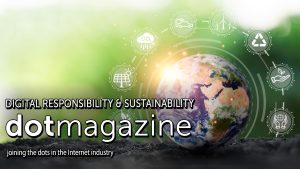In the ever-evolving landscape of the Internet industry, decision-makers face multifaceted challenges that require innovative solutions. In this dotmagazine issue, our latest collection of articles delves into crucial aspects of responsible digitalisation, technology and sustainability, providing insights and perspectives from experts in the field.
First up, in stressing the interconnectedness of digitalisation and reducing CO2 emissions, Oliver Süme, Chair of the eco Board, and Béla Waldhauser, Spokesperson of the Alliance for the Strengthening of Digital Infrastructures in Germany, make a compelling case for the positive impact of digital technology on sustainability. They urge policymakers to recognise the potential of technology as a key player in achieving environmental goals.
Reducing the carbon footprint of digital infrastructure
Regarding such potential, one critical but often overlooked aspect of digitalisation is the environmental impact of cloud infrastructure. In this context, Falk Weinreich of OVHCloud shows how businesses can assess the sustainability of their cloud services, emphasising metrics like Water Usage Effectiveness (WUE) and Power Usage Effectiveness (PUE). Using tools such as Carbon Calculators, companies can make informed decisions on how to minimise their carbon footprint.
From another perspective, with data centres standing as a fundamental element of the world’s digital sphere, it is naturally important to learn how they can minimise their environmental impact. In a compelling case study, ABB showcases its collaboration with the University of Göttingen to build a sustainable High-Performance Data Center (HPDC). With a focus on climate protection and scalability, the article details the integration of ABB’s solutions, emphasising the significance of flexible power distribution for sustainable IT operations.
Transitioning from data centres to the broader landscape of digital innovation, Corning and Sphera contribute valuable insights into the green potential of optical fibre. Revolutionising connectivity with its low carbon footprint, their article highlights the significant difference in carbon footprints between optical fibre and copper networks, emphasising the role of energy efficiency and a greener power mix in further reducing environmental impact.
Digital responsibility
All in all, in addressing such sustainable digitalisation, governments clearly must play a core role. On this topic, eco Managing Director Alexander Rabe addresses the challenges faced by the German coalition in fulfilling its digitalisation ambitions. Calling for greater coordination by the digital ministry, Rabe proposes a solution to ensure synergy between various departments. Effective digital responsibility becomes paramount as Germany strives to further establish itself as a digital location.
Digital responsibility also involves addressing imbalances and inequalities in the industry. Leoni Rossberg from Groundbreaker takes us through an inspiring journey of empowering women in Uganda and bridging the gender gap in the tech industry. The Talents Program equips young women with valuable skills and fosters self-confidence, paving the way for sustainable change within communities.
As we navigate the intricate web of technology and sustainability, these articles collectively underscore the responsibility of decision-makers to drive positive change in the Internet industry. Through informed choices and collaborative efforts, we can pave the way for a more sustainable digital future together.




